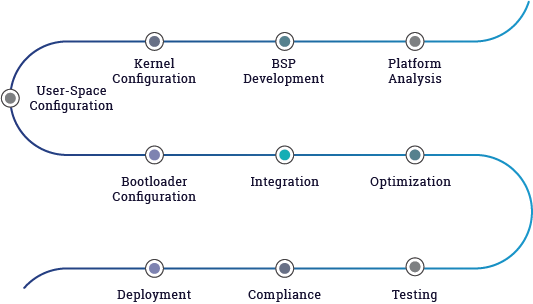Linux/Android Porting
Linux/Android porting is the process of adapting a Linux or Android operating system to run on a new or existing hardware platform. Porting is necessary when a device manufacturer wants to use a Linux or Android operating system on a device with different hardware, such as a new smartphone model, or when a hardware vendor wants to support Linux or Android on a new platform.
In the medical technology landscape, Linux and Android have emerged as powerful platforms for building scalable, secure, and feature-rich medical devices. Their flexibility, stability, and open-source nature make them ideal for medical applications requiring real-time data processing, connectivity, and user-friendly interfaces. Silmates specializes in Linux and Android porting for medical devices, ensuring seamless integration with embedded systems, IoT, AI, and cloud-based healthcare solutions.

As medical devices evolve to provide enhanced connectivity, real-time data processing, and AI-driven diagnostics, Linux and Android have become foundational platforms in medical technology. These operating systems offer flexibility, security, scalability, and compliance—essential for developing embedded, portable, and AI-enabled medical solutions.
The porting process includes several steps, including:-
Board support package (BSP) development: Creating the low-level software drivers and system configurations necessary to support the new hardware platform. This includes writing drivers for the hardware components, such as the CPU, memory, storage, and peripherals, and configuring the system to boot and run on the new hardware.
Kernel and driver adaptation: Adapting the Linux or Android kernel and drivers to work with the new hardware platform. This includes modifying the kernel and drivers to support the new hardware components, and testing and debugging the kernel and drivers on the new hardware.
Application adaptation: Adapting the Linux or Android applications and user interface to work with the new hardware platform. This includes modifying the applications to support the new hardware components and screen resolution, and testing and debugging the applications on the new hardware.
Certification: Testing and certifying the ported Linux or Android system to meet the requirements of the hardware vendor or device manufacturer, and to ensure compatibility with the software and hardware ecosystem.
Linux/Android porting requires a deep understanding of the Linux or Android operating system, as well as the hardware platform being ported to. It also requires expertise in software development and debugging, as well as experience with low-level software development, such as device drivers and system configurations.
Porting Linux or Android to a new platform can be a complex and time-consuming process, but it enables device manufacturers and hardware vendors to offer Linux or Android devices with a wide range of hardware and performance options.
Process Flow Diagram

